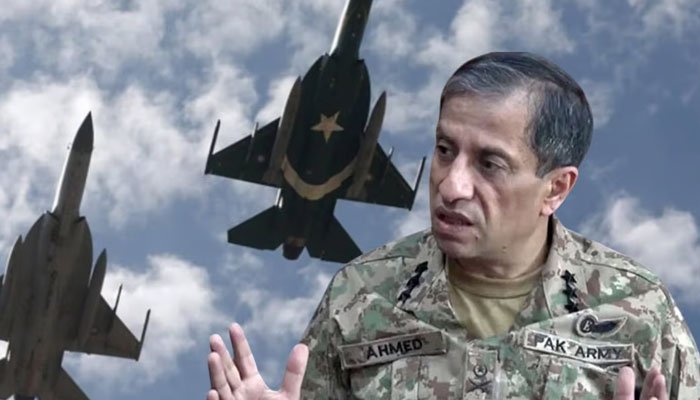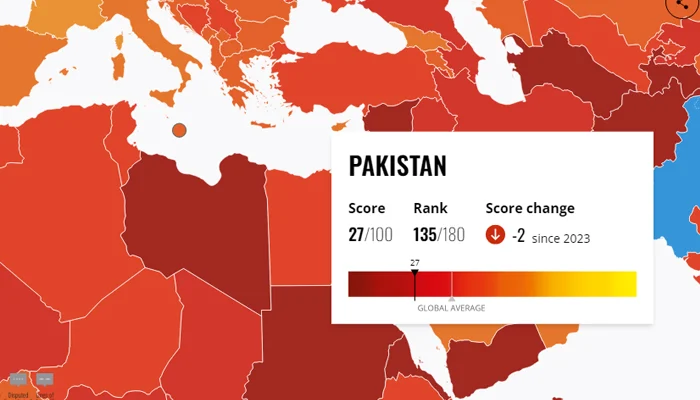Lt Gen Ahmed Sharif Chaudhry stressed that Pakistan does not seek to enter an arms race with India.
Not a Single Pakistani Jet Downed in May Clashes: DG ISPR. Director General of Inter-Services Public Relations (ISPR) Lieutenant General Ahmed Sharif Chaudhry has strongly denied Indian claims that Pakistani aircraft were shot down during the recent aerial clashes between the two countries in May. Speaking in an exclusive interview with Bloomberg, the army spokesperson said that not a single Pakistani jet was lost during the intense exchange of strikes between the two nuclear-armed nations.
Earlier, Indian Air Force (IAF) chief claimed that India had downed six Pakistani Jets in May clashes. While Pakistan rejected the Indian IAF chief claims.
An interview with Bloomberg TV, Chief of Defence Staff General Anil Chauhan had confirmed that India lost fighter its jets in the May 2025 clashes with Pakistan while he did not disclose how many jets were downed.
“Pakistan has never manipulated or hidden facts. In the Maraka-e-Haq, India could not bring down a single Pakistani aircraft,” said Lt Gen Chaudhry, using the phrase “Maraka-e-Haq” to describe the latest confrontation between Indian and Pakistani forces.
His remarks came in response to Indian media reports and official statements claiming that their forces had successfully downed Pakistani fighter jets during the engagements. These claims have been circulating on several Indian news outlets, with officials suggesting that the Indian Air Force had neutralized advanced Pakistani platforms in retaliation to strikes across the Line of Control (LoC).
Background of the Clashes
The May conflict was one of the most intense military engagements between the two countries since the Balakot air strikes in 2019. Both sides conducted air operations, and tensions escalated with deeper cross-border attacks.
While Indian officials claimed tactical success, including the downing of Pakistani aircraft, no independent verification has been provided. In contrast, Pakistan’s military has consistently maintained transparency, offering both operational briefings and on-ground visuals to counter the Indian narrative.
Adding weight to Pakistan’s stance, Bloomberg reported that then-US President Donald Trump confirmed that seven Indian aircraft were downed during the engagements. According to Bloomberg, Pakistan’s Chinese-made J-10C fighter jets played a key role in the aerial combat, successfully engaging and shooting down several Indian Air Force jets, including French-built Rafale fighters, which India had recently inducted.
Focus on Capability, Not Arms Race
Lt Gen Ahmed Sharif Chaudhry stressed that Pakistan does not seek to enter an arms race with India. He said the country’s military development strategy is centered on operational readiness, efficiency, and cost-effective defense platforms. He noted that while Pakistan remains open to acquiring new technologies, it focuses more on performance and integration than prestige.
“Pakistan’s defense modernization relies on a balance of indigenous capabilities and trusted partnerships, especially with nations like China,” he said.
In recent years, Pakistan has expanded its use of Chinese and Western military platforms. Bloomberg noted that the Pakistan Army has recently inducted the Z-10ME attack helicopter, boosting its rotary-wing strike capabilities. This addition strengthens the country’s existing fleet, which includes the US-made F-16s and a range of Chinese-developed systems.
Performance of Pakistani Systems
During the conflict, Pakistani weapon systems demonstrated high performance, according to ISPR. The integration of Chinese platforms like the J-10C, combined with locally upgraded systems, allowed Pakistani forces to maintain air superiority without suffering major losses.
Lt Gen Chaudhry also noted that the results on the battlefield reflect the success of Pakistan’s strategy to rely on tested platforms that meet the specific needs of its defense doctrine. He emphasized that Pakistan’s military posture remains defensive, but it retains the ability to respond effectively to any threat.
Regional Stability & Future Outlook
The ISPR chief’s comments underscore Pakistan’s balanced approach to regional defense—maintaining strength without aggressive expansion. Despite India’s claims, Pakistan continues to advocate for peace but remains prepared to respond to provocation.
In summary, the May conflict has once again highlighted the importance of credible information, military readiness, and strategic clarity. Pakistan’s response, according to ISPR, is not just about winning battles, but maintaining long-term peace and stability in the region through strength and transparency.





